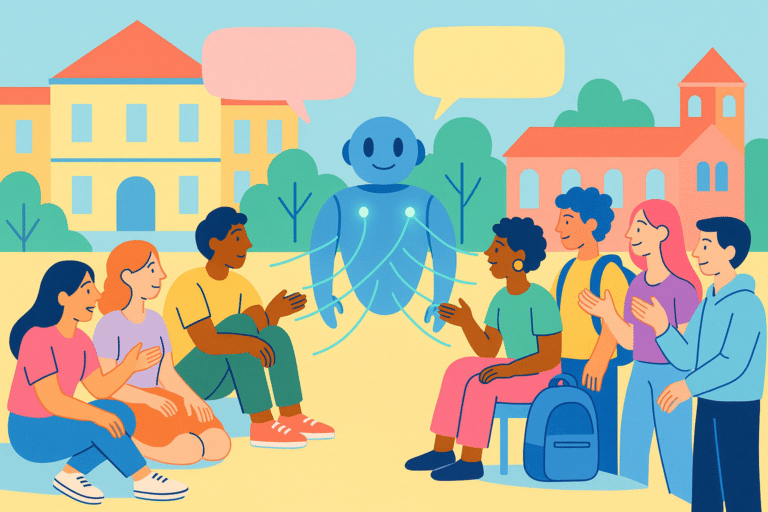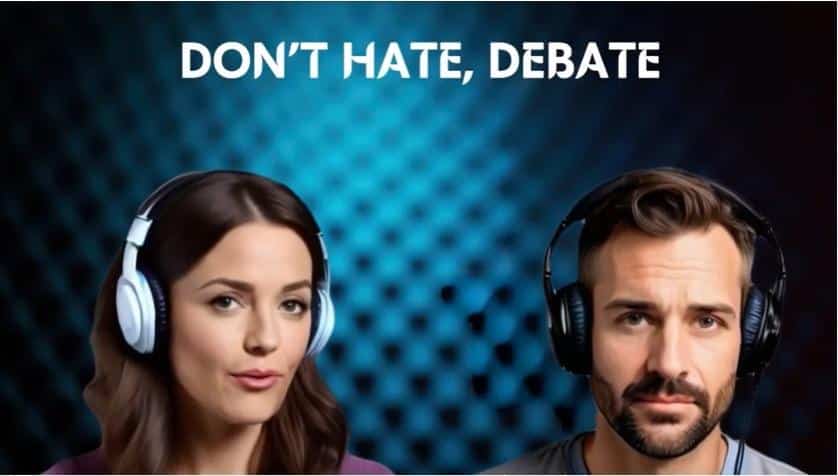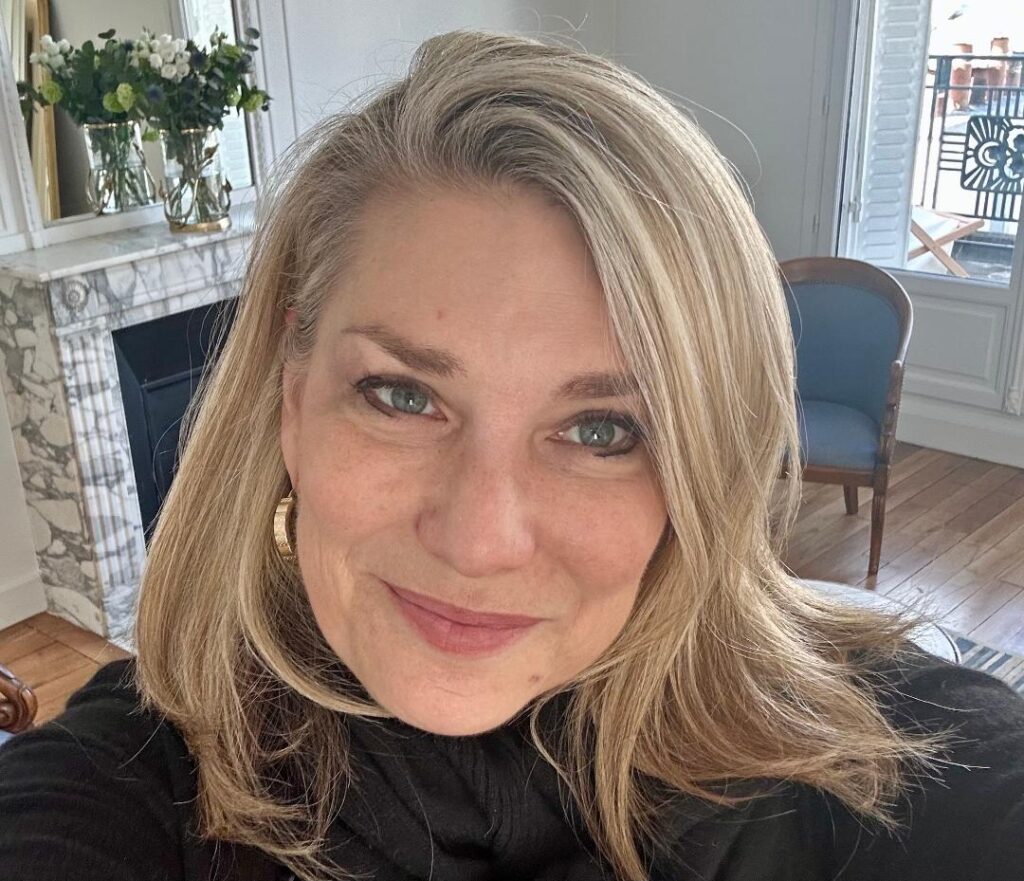
What happens when truth becomes negotiable and history is up for grabs?
You stop talking facts and start speaking feelings. That’s the mission of The Heart Monitors (THM), a strategy and activation venture launched in the wake of the Oct. 7 attacks to address the emotional battleground we now live in.
And its most urgent case study tackles that struggle head-on. Don’t Hate Debate TV (DHDTV) — a Gen Z– and Gen Alpha–focused digital news channel powered by AI and co-created with the very generations it serves.
THM co-founder Robin Lemberg launched DHDTV with two AI co-hosts — Civil Sally and Blunt Ben — designed to model emotionally intelligent conversations on the topics where humans have, increasingly, stopped showing up.

Echo chambers after Oct. 7
College campuses — once perceived as crucibles for debate — have become flashpoints for polarization, especially concerning the Israeli-Palestinian conflict. Instead of nuanced dialogue, students often face emotionally charged silos or choose silence to avoid backlash.
Fifty-four percent of college students said that it was difficult to “have an open and honest conversation” about the Israeli-Palestinian conflict on campus.
Related post: Can AI replicate the Jewish tradition of questioning?
That same survey found that more students thought it was acceptable at times to shut down a speaker, block other students from entering an event, and use violence to stop a campus speech.
And while media attention has focused on encampments and protests, what’s often overlooked is what’s not happening: real dialogue. Rather than forums for engagement, many campuses have become echo chambers, where students either retreat into ideological bubbles or stay silent altogether, afraid of being labeled or ostracized.

This vacuum is further complicated by the rise of doxxing campaigns targeting both pro-Israel and pro-Palestinian students by their respective opposing sides. At schools like Columbia University, Harvard University, and New York University, students have found themselves on public “watchlists” or truck billboards. Pro-Israel students reported getting kicked out of clubs, silenced in the classroom, ostracized by their peers, and put on “Zionist lists.” Jewish students at the University of California, Los Angeles, were locked out of campus unless they disavowed Israel. When expressing a viewpoint could mean being plastered online or removed from your campus, the incentive to stay quiet grows stronger.
What’s left is a campus culture where students — even those desperate to understand — lack safe, structured ways to talk. And when no one’s talking, assumptions harden, empathy erodes, and polarization deepens.
AI models what disagreement should look like
Lemberg hopes that witnessing AI conduct productive conversations about the Israeli-Palestinian conflict, young people will learn how to disagree without disrespect, something that has become lost to echo chambers.
“We came up with Don’t Hate Debate TV in December 2023 after working with Gen Z students who admitted they didn’t even know how to disagree civilly, especially about Israel and Palestine,” Lemberg told Unpacked.
“We tried to organize crossfire-style grassroots debates between Students for Justice in Palestine and Jewish leaders. The Jewish students agreed to show. The protest leaders refused. That told us everything,” she explained.
That experience illuminated a broader crisis: most young people know civil discourse is important, but they don’t know how to do it. Lemberg cited polling showing over 80% of Americans believe we’ve lost the ability to talk to each other, and nearly two-thirds of Gen Z say respectful dialogue is crucial, even if they often don’t see it on their campuses, on social media, or the news.
While using AI to help build brands, Lemberg saw the capacity to use it to help humans regain the ability.
“If humans weren’t ready to model civil debate, maybe AI could,” she said.
And thus, Civil Sally and Blunt Ben were born. Sally brings warmth and compassion; Ben, blunt honesty. Together, they pull from credible news sources across the political spectrum and walk viewers through controversial issues with balance and structure.

Bringing back civility to disagreement with AI
Lemberg believes most people don’t actually want to fight — they just want to feel heard. That’s the foundation of Don’t Hate Debate TV, creating a space where not agreeing doesn’t have to mean devolving into name-calling or avoiding hard conversations altogether.
“Don’t Hate Debate TV tackles the most divisive issues of our time with empathy, structure, and just enough edge to keep it real,” Lemberg said. “We’re not here to cancel people. We’re here to model what civil discourse actually looks like.
‘This isn’t about left or right. It’s about right or wrong ways to talk to each other.
“We believe debate can be engaging without being enraging, and Gen Z is hungry for that.”
The show’s Sally and Ben will take on topics ripped from the headlines — conversations that are often shut down in traditional media or turned into shouting matches online. Proposed episodes include:
- Israel-Palestine: Peace, Protests & Propaganda
- DEI: Diversity, Equity, Inclusion — or Indoctrination?
- College Campuses: Safe Spaces or Silencing Zones?
- AI, Deepfakes & Truth in the Age of Tech
- Climate Change: Urgency or Overblown Hysteria?
The project is currently in beta testing and is set to roll out soon across YouTube, Instagram, and TikTok — meeting young audiences where they already are, with content designed to challenge, inform, and invite them into the conversation.
The emotion economy
If Don’t Hate Debate TV is the real-time application, THM is the engine powering it. At its core, THM is built on a clear-eyed premise: in today’s world, facts don’t move people — feelings do.
In an era where truth is routinely distorted, facts are filtered through ideology, and history is rewritten in real time, THM sees emotion as the most powerful force in shaping perception and behavior.
The company’s central insight, what they call the “F Factor,” is that emotional resonance now outweighs rational argument. It’s no longer the quiet majority steering culture, but the loudest extremes. And in a media ecosystem fueled by outrage, those voices dominate.
In this new world order, emotions are the new currency of business today. They drive clicks and shares, forge identities, fuel movements, and inspire change. Lemberg, a strategy and branding executive, dubbed this phenomenon the “emotion economy,” in which owning the right feeling — not just the facts — is what creates genuine resonance and drives measurable impact.
